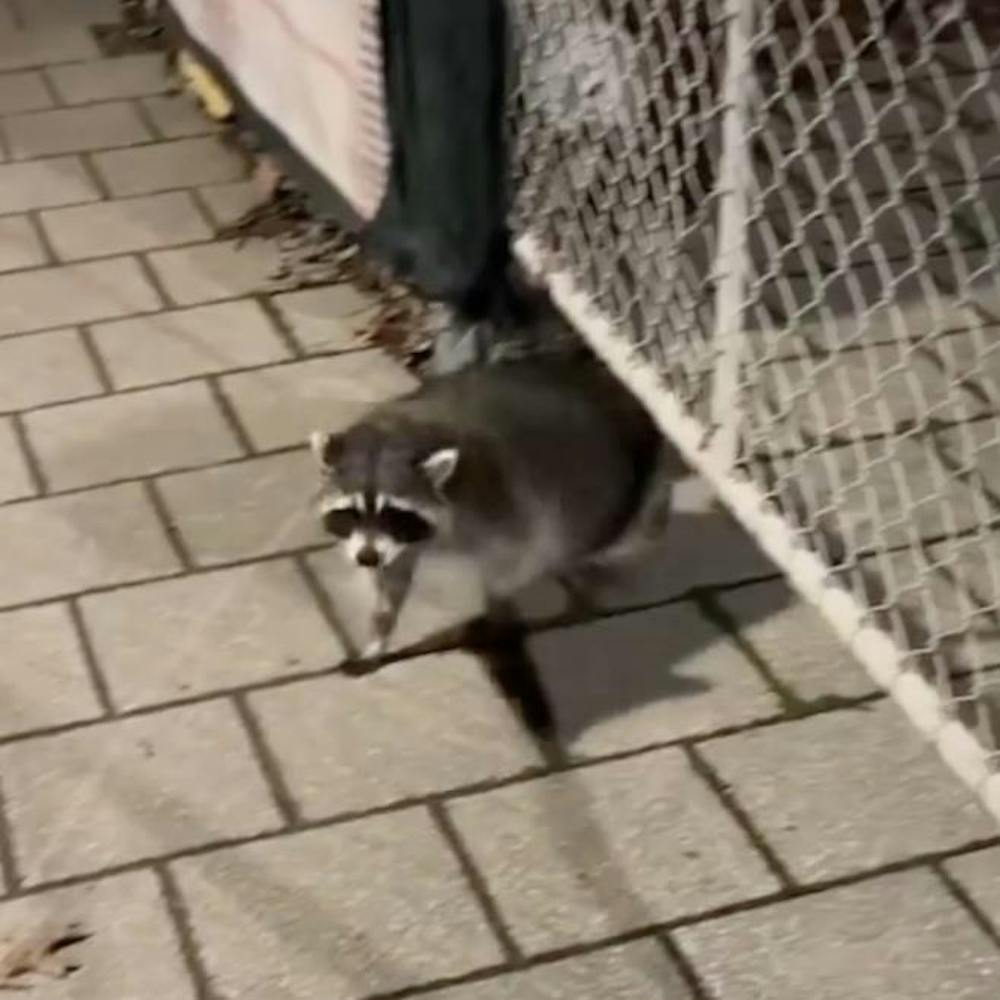A possibly rabid raccoon attacked and bit Kathleen Li ’24 on Monday night. Li said she encountered the animal between Dod Hall and the Art Museum construction site around 9:00 p.m.
In a video clip from Li, which was later posted to the @barstoolprinceton Instagram account, the raccoon can be seen running under a fence before pouncing on Li’s leg and biting her. After a brief scuffle, the animal flees into the night.
A campus message with the subject line “TIGERALERT: Raccoon Bite” was issued to the University community on Tuesday. According to the alert, several additional raccoon encounters were reported in the Municipality of Princeton.
“The University is in contact with Animal Control from the Municipality of Princeton, who is working to capture the animal,” the message reads. “The animal on campus and in the community exhibited behaviors consistent with infection from rabies virus.”
The message advised against approaching, feeding, or touching wild or stray animals, to secure trash cans, and to ensure pets are up to date on rabies vaccinations. It also requested that students contact the Department of Public Safety (DPS) in the case of contact with an animal behaving unusually.
According to the Center for Disease Control, two common symptoms of rabies in animals are abnormal behavior and aggression. Rabies can be transmitted between animals in the same environment when a symptomatic rabid animal bites another animal.
There have been rabies scares on campus in the past, including in 2020, when a bat crashed into an ECO 100 lecture in McCosh 50. In 2019, bats invaded Holder Hall, 1976 Hall, and Frist Campus Center.
Li shared that she sought emergency care immediately after and has started the rabies sequence.

In an email to The Daily Princetonian, Li wrote, “I haven’t watched the video back myself but I know it started with a slow walk and then jumped at me.”
In the video that she filmed, Li can be heard screaming “Oh my god, ah, oh my god, oh my god” as the raccoon approached and then ultimately bit her.
According to data from the New Jersey Department of Health, which tracks confirmed rabies cases statewide since 1989, raccoons are perennially the most common carriers of the disease. In Mercer County, there have been 398 total cases from raccoons reported. In preliminary data for 2023, last updated Sept. 28, there have been four rabid raccoons identified this year.
The Municipality of Princeton also wrote on its website that “raccoons and bats are the most commonly rabid animal currently found in Princeton.”

Professor of Ecology and Evolutionary Biology Robert Pringle wrote in a statement to the ‘Prince’ that rabid animals “often display no hint of fear (or awareness) of people around them.”
He added that “they might have impaired locomotion, as if drunk” and “may be active at unusual times of day.”
According to Pringle, raccoons and other animals are drawn to campus for access to food, such as uncovered trash cans. He noted that while it is not unusual for raccoons to be unafraid of humans, this may be exacerbated in a campus setting, where people are often present.
“All animals habituate to human presence if the humans are not hurting or hunting them.” He added, “Some do it quicker and more completely than others, and those are the ones (including raccoons) that tend to thrive in urban or otherwise heavily developed areas.”
Pringle recounted a personal encounter defending a campsite from habituated raccoons.
“At dusk, a ring of raccoons started closing in around our campsite, and the minute it got dark, they started darting in for our food and water,” he wrote. “They got pretty much all of it, because we didn’t have any safe place to put it. They got the lids off the water bottles (and what they didn’t drink spilled onto the ground),” he said.
“I had a similar experience with habituated baboons in Kenya,” Pringle added.
The TigerAlert, sent to the entire University community, has generated significant discourse on campus.
One student commented on the Barstool Princeton post, “I would have punted that jawn.”
Candidate for University Student Government (USG) Vice President Chase Magnano ’25 stated at the recent vice presidential debate, in response to a question about keeping a live tiger on campus as a mascot, that he cared about animal rights. He offered a potential policy solution to the incident.
“I think that some students seem so fond of the raccoon. We should make a raccoon petting zoo that students can stop by in between classes,” Magnano said in an interview with the ‘Prince.’
In a statement Magnano provided to the ‘Prince’ following the interview, he wrote “I would also like to offer USG funded rabies shots for all students at the petting zoo.”
Tess Weinreich is an associate News editor at the ‘Prince.’
Please direct any corrections requests to corrections[at]dailyprincetonian.com.








